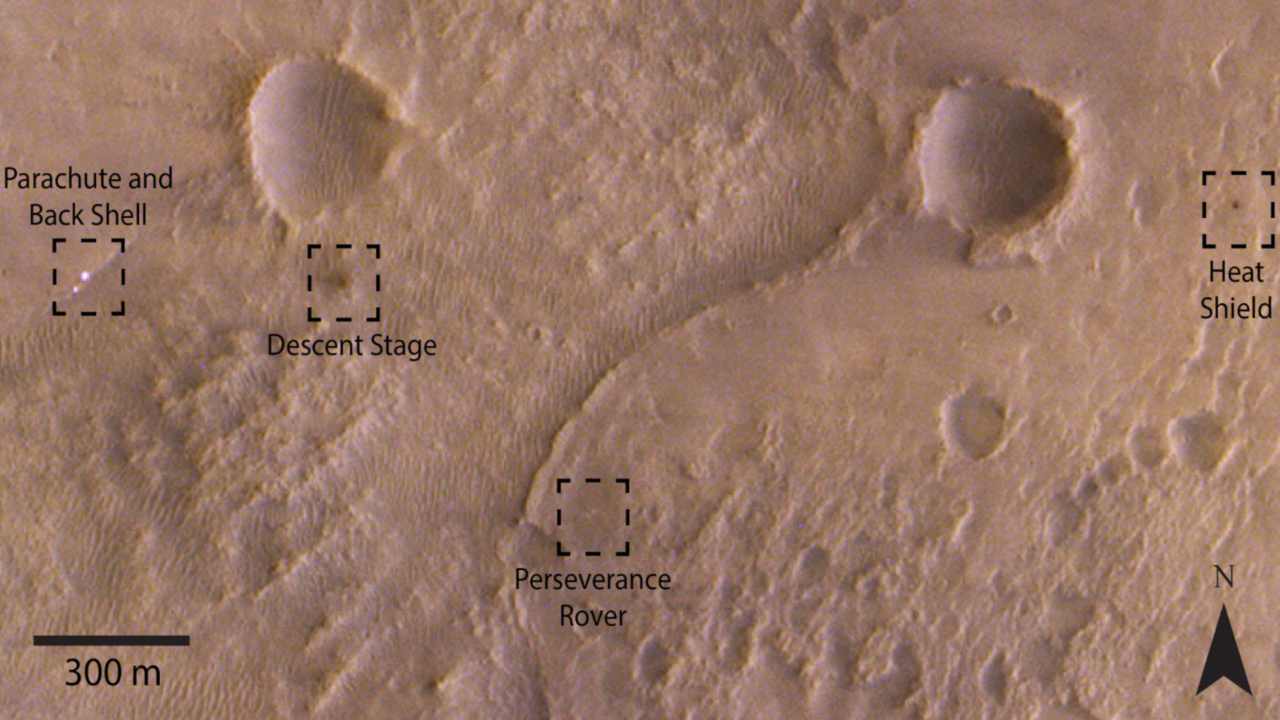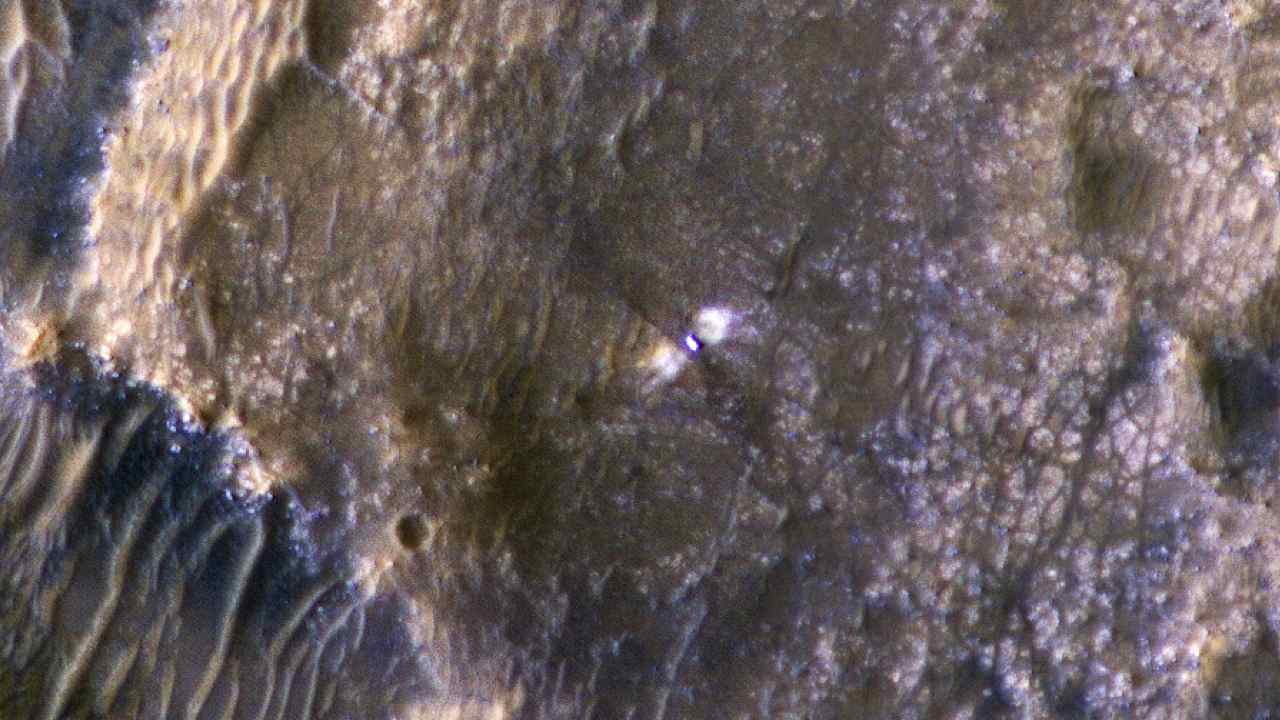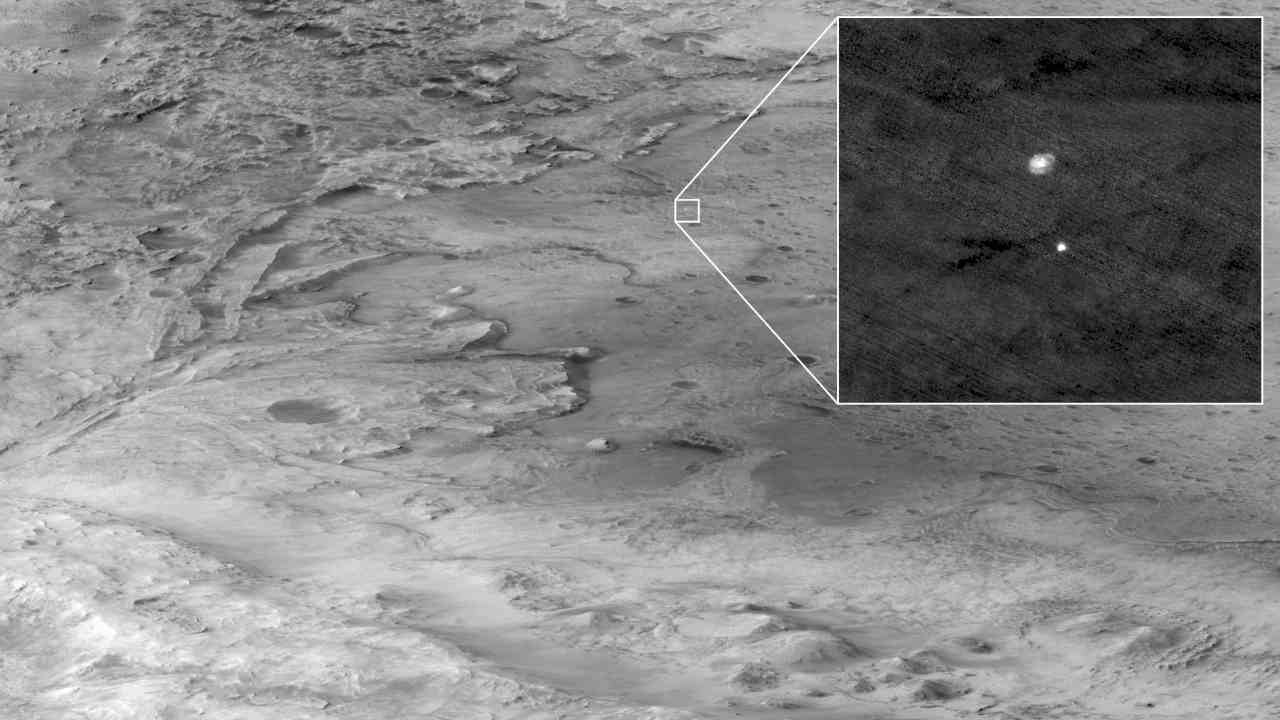tech2 News StaffMar 02, 2021 13:09:05 IST
After making its widely-celebrated successful landing on 18 February, the Perseverance rover has now completed 12 days on Mars, parked and scoping out its landing site in the Jezero Crater. In the days since its landing, visuals from and 0f the rover have been shared by NASA. The newest is a wide view of the rover and components it shed during its descent littered on the surface of the Red Planets, captured by the ESA’s Trace Gas Orbiter.
In images captured by the Mars TGO, the descent stage and heatshield are visible as dark spots spaced around two smaller craters, while the parachute and backshell are visibly bright and physically close to each other. The Perseverance rover, seen in the lower centre of the images, is a relatively faint spot visible next to a ridge connecting to one of the smaller craters.
There you are @NASAPersevere! I finally got the chance to take a photo of you in your new home
#CountdownToMars
@ExoMars_CaSSIS https://t.co/Zl2FhZ2Z8q #ExploreFarther #Mars pic.twitter.com/1CoOrs1r1S
— ExoMars orbiter (@ESA_TGO) February 25, 2021

TGO spotted the Perseverance rover, its parachute and back shell, heat shield and descent stage, in the Jezero Crater region of Mars. Image credit: ESA/Roscosmos/CaSSIS/A Valantinas
The TGO, since its arrival on Mars in 2016, has gathered vital data on the planet’s atmospheric gases and compositions. TGO has been looking specifically for traces of methane or other gases that could originate from geological or biological activity beneath or on the surface of Mars.
Another camera, the High Resolution Imaging Experiment (HiRISE) on NASA’s Mars Reconnaissance Orbiter, spotted Perseverance at its landing site, six days after touchdown, in the process of system checks. From the orbiter’s vantage point over 250 kilometres away in orbit, the ground below Percy’s wheels appears to be loose, dark material, with brighter material underneath. The bright zones are visible on either side of the rover, likely “scoured clear by the descent stage rockets” during descent, as per a statement on the HiRISE website.
HiRISE spotted the Perseverance rover every few days by rolling the Mars Reconnaissance Orbiter to its side as it passes overhead. The photograph was taken from roughly 290 kilometres away, the statement adds.

Perseverance rover and the Jezero Crater around it, as seen by HiRISE on 24 February. Image Credit: HiRISE: Beautiful Mars/Twitter

The descent stage holding Percy can be seen falling through the Martian atmosphere, its parachute trailing, in this 18 Feb image taken by HiRISE. Image: NASA
[High-resolution photograph of Perseverance in the Jezero Crater, captured by HiRISE, here]
The HiRISE images of Perseverance were shared on the official Twitter account of the instrument team at NASA.
NASA Perseverance on the Ground in Color
Perseverance can be seen in this enhanced HiRISE color image at its landing site, six days after touchdown, doing system checks. The site appears to be covered in loose dark material with brighter material underneath.
NASA/JPL/UArizona pic.twitter.com/AO9fsvY0kr
— HiRISE: Beautiful Mars (NASA) (@HiRISE) March 1, 2021
Perseverance will camp in and around its landing site in Jezero Crater for the next two years, looking for clues of past microbial life. Apart from the many features of the Crater that liken it to other locations on the underexplored surface of Mars, there exist what scientists think are preserved river deltas and clay-rich sedimentary deposits. The Jezero Crater is known to have hosted a standing body of water billions of years ago, and so, was chosen as Percy’s landing site for the NASA mission to study past life on Mars.
Perseverance will also collect samples of Martian rock and soil in a cache to be returned to Earth in an independent ESA-NASA sample return mission that is yet to be announced. Once there, an orbiter will pick them up and bring them home for analysis.
Post a Comment